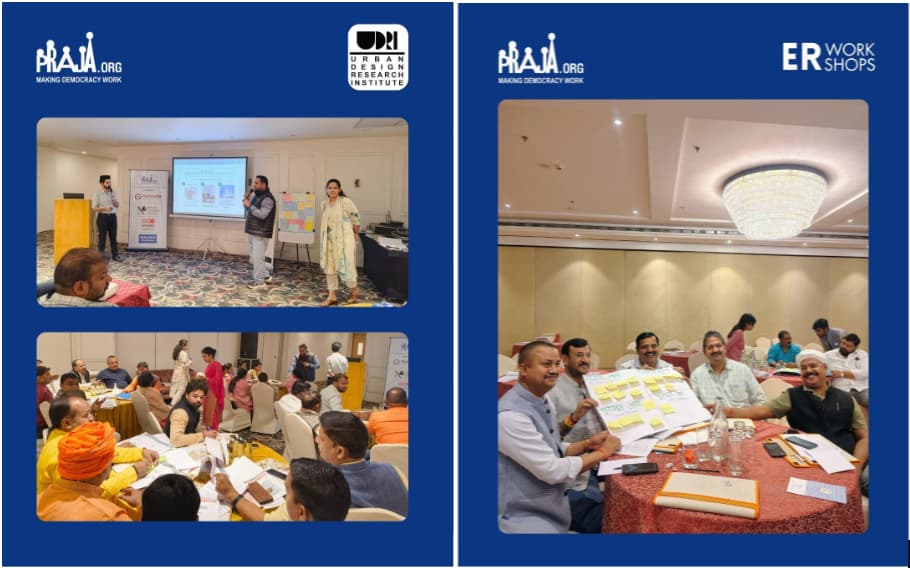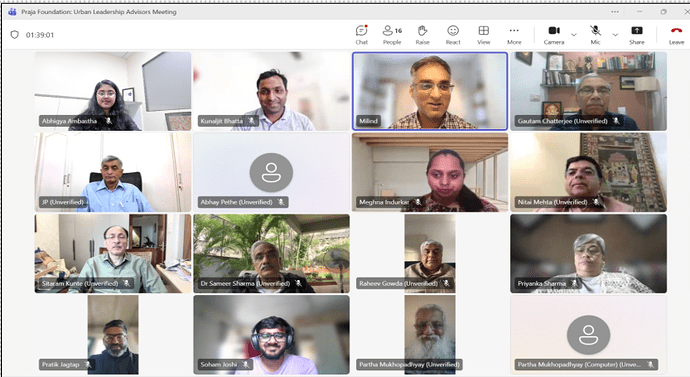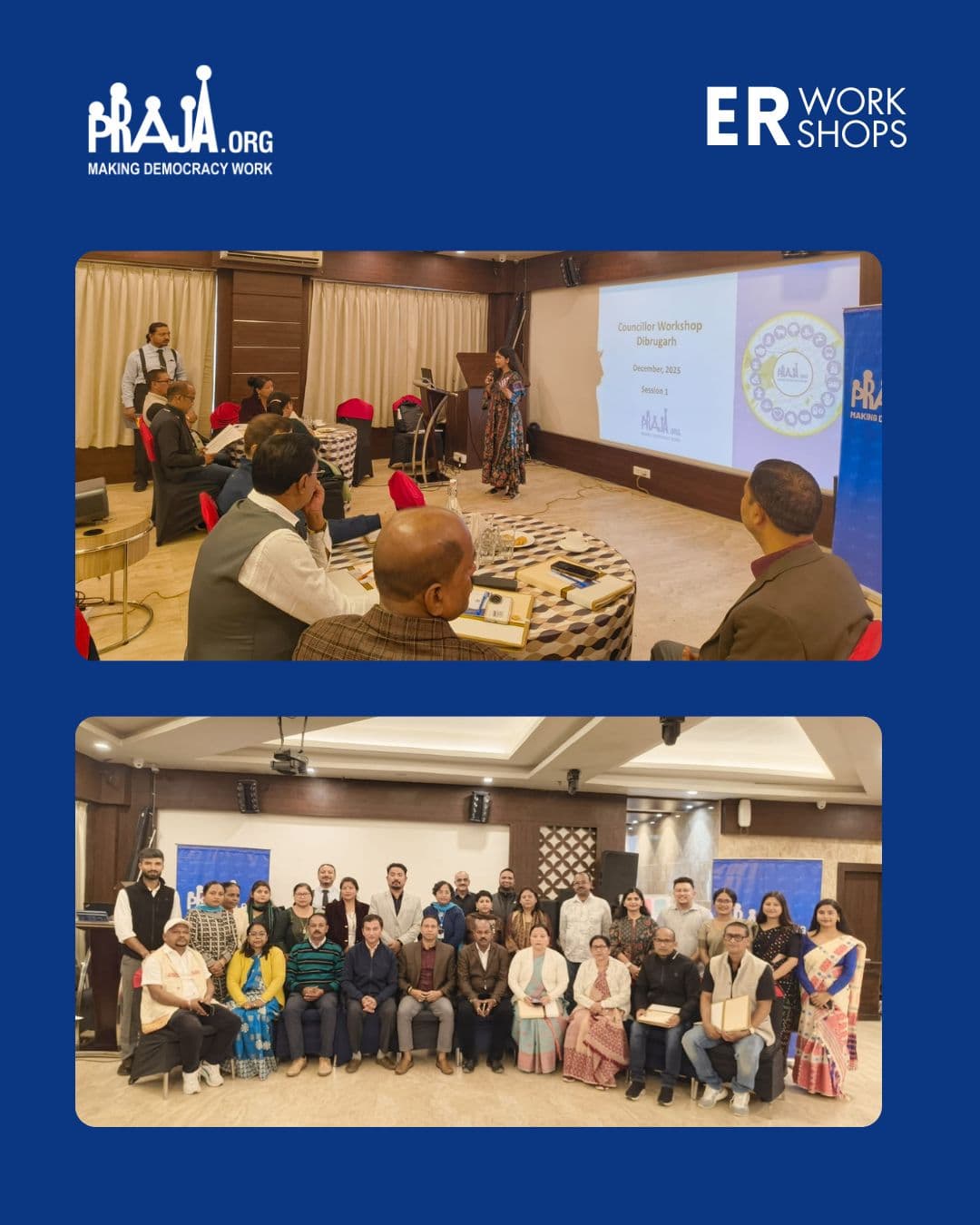Hello!
We’re excited to share our very first update here and look forward to engaging with this community on urban governance and climate action.
About Us
Praja is a non-partisan organisation dedicated to improving the quality of urban life for the last 28 years. We conduct data-driven research on civic issues and work closely with citizens, media, government administration and elected representatives. Our goal is to bridge information gaps, strengthen accountability and equip decision-makers to address inefficiencies through informed, corrective measures.
Since our inception, we have partnered with municipal corporations to introduce citizen charters, revamp grievance redressal systems and publish annual white papers on key urban issues including health, housing, education, crime and governance. We also produce annual report cards ranking the performance of MLAs and councillors in Mumbai and Delhi and conduct workshops and trainings to build the capacity of elected representatives, administrators and citizens.
Praja’s research-led advocacy has influenced policy at the national level. Our Urban Governance Index (UGI), first launched in 2020 and updated in 2024 (UGI 2.0), ranks and analyses governance in 31 cities across India. UGI data is regularly referenced by the Ministry of Housing and Urban Affairs (MoHUA), NITI Aayog and the National Institute of Urban Affairs (NIUA) in their policy work. Praja is represented in five MoHUA working groups on urban reforms and partners with NIUA for research and advocacy programmes.
Background
India is witnessing an unprecedented pace of urbanisation, with cities contributing significantly to economic growth while aggravating environmental challenges. Rapid urban expansion has intensified issues such as air pollution, waste management and rising greenhouse gas emissions, making cities key battlegrounds in the fight against climate change. Local political leaders, including mayors and municipal councillors, play a pivotal role in addressing these challenges. Their decisions on urban planning, transportation, energy efficiency and waste management directly impact a city’s carbon footprint, resilience and its ability to create green jobs. Green jobs would contribute to preserving or restoring the environment, are essential for building a sustainable urban economy. Integrating climate mitigation into governance not only reduces environmental harm but also unlocks opportunities for employment in sectors like renewable energy, sustainable construction and waste management. To realise these opportunities, leaders must understand the intricate linkages between policy choices and environmental outcomes. By adopting sustainable practices and driving climate-responsive initiatives, local political leaders can transform cities into hubs of green growth, ensuring development that balances economic progress with ecological sustainability.
As cities grow and urban challenges become increasingly complex, the role of urban leaders such as mayors, deputy mayors, standing committee chairperson, Mayor-in-council (MIC) members municipal administration, members of legislative assembly and civic leaders from NGOs, business and academia is more critical than ever. These leaders are responsible for navigating the intricacies of municipal governance, ensuring efficient service delivery, managing urban planning and addressing issues like climate change, infrastructure development and sustainable growth. However, many urban leaders face gaps in technical knowledge, strategic planning and leadership skills, limiting their capacity to drive impactful change. Training programs are essential to equip them with a deep understanding of municipal acts, finance, urban policies and sustainability practices. The Prajatantra Urban Leadership programme will build the capacity of these leaders to make informed decisions, implement innovative solutions and foster resilient, inclusive cities that address the needs of their growing populations.
Key Highlights of Our Initiatives
Gurugram Intervention
RWA Climate Action Workshop
On 19th July, Praja Foundation in collaboration with URJA and its President, Mr. Atul Goyal, brought together Resident Welfare Associations (RWAs) from across Gurugram on a single platform to strengthen climate governance at the grassroots.
The workshop created a space for RWAs, State Managers and Presidents to reflect on the environmental challenges they face in their communities, from waste management and water conservation to energy efficiency and green mobility. Just as importantly, it was a space to co-create sustainable solutions, share climate-responsive practices and ideate on future-ready initiatives to make our neighbourhoods more resilient, inclusive and environmentally sound.
Administrative Workshop
On 25th July, Praja Foundation successfully conducted capacity building workshop for Administration officials, bringing together key stakeholders to drive sustainable climate action in Gurugram. The workshop was conducted by, Anindya Bhattacharya from The Celestial Earth, who discussed the Gurugram Climate Action Plan (GCAP) and its implementation strategies and Ms. Parul Agarwala, Country Programme Manager India at UN-Habitat, who shared insights on sustainable urban planning and climate action strategies.
The workshop was attended by senior administrators from various departments including the Municipal Corporation Gurugram, Gurugram Metropolitan Development Authority and Haryana Shehri Vikas Pradhikaran, among others. The workshop was also attended by Praja Foundation’s Delhi team and our interns & fellows.
Councillor Workshop
On 6th August 2025, Praja Foundation successfully conducted a comprehensive capacity-building workshop with Municipal Councillors of Gurugram, including the Mayor. The interactive session covered key topics such as:
-
74th Constitutional Amendment
-
Understanding and interpreting Municipal Corporation Act
-
Roles and responsibilities of councillors
-
Municipal Corporation committees and procedures
The councillors and Mayor actively participated in the discussion, committing to regular corporation meetings and the formation of ad-hoc committees in Gurugram. This workshop aimed to enhance their knowledge and effectiveness in governance.
Assam Intervention
MoU with Dibrugarh Municipal Corporation
On 5th July 2025, Praja signed an MoU with Dibrugarh Municipal Corporation to strengthen urban governance. Focus areas include:
-
Capacity-building programmes for elected representatives
-
Strengthening municipal finance
-
Enhancing e-governance systems
-
Advisory support for governance reforms
Assam Climate Action Fellowship
In August, the first cohort of Praja Governance & Climate Action Fellows from Assam embarked on their journey towards transforming urban governance. For the first time, we brought together passionate individuals for a comprehensive four-day orientation at Don Bosco Institute of Management, Guwahati.
The program immersed them in foundational principles of urban governance, constitutional values and their roles within the fellowship. Through expert-led sessions, interactive activities and energisers, the fellows gained insights into key institutions, climate action frameworks and municipal finance.
They were also equipped with essential skills like reporting formats, email etiquette and team dynamics. This orientation marked the beginning of a transformative journey, empowering fellows to engage effectively with local bodies and stakeholders and drive positive change in urban governance.
Organisation Development
Interactive Session with UN-Habitat
On 9th July, Praja Foundation hosted an interactive session with Parul Agarwala, Country Manager, UN- Habitat, India focused on the Urban Sustainability Assessment Framework. The discussion started by addressing extreme poverty and slum dwelling, then transitioned to a deliberation on climate change. It was emphasised that development is an ongoing process. Bridging the communication gap between citizens and governance bodies can be achieved through local climate mitigation strategies.
Practical research and fostering trust within local communities are crucial for development, as a lack of trust can lead to community disintegration. The session concluded with an in-depth discussion on Urban RAASTA, an urban planning tool that provides valuable insights for city managers, administrators, planning departments and policymakers.
Visit to WRI India
Our Delhi team recently joined WRI India’s workshop “Moving Towards a Safer and Inclusive Delhi”, which brought together discussions on two urgent urban challenges: road safety and air pollution. The sessions explored how unsafe road design and rising emissions affect millions and what practical solutions cities can adopt, from low-emission zones and cleaner mobility choices to people-centric street design that prioritises pedestrians and vulnerable groups. It featured an in-depth briefing led by WRI experts, followed by an engaging Q&A session that facilitated knowledge exchange and practical insights.
The participants engaged in street activity navigating footpath in wheelchair and while blindfolded. This was an eye-opening experience of how design decisions affect the barriers faced by especially abled people in our cities. The key takeaway from this session was the importance of building cities that are safe, inclusive and liveable requires not just better infrastructure, but also collaboration across governments, institutions and communities.
We look forward to sharing more updates as we continue our work towards transparent, accountable and climate-resilient urban governance across India.
Website: www.praja.org




























